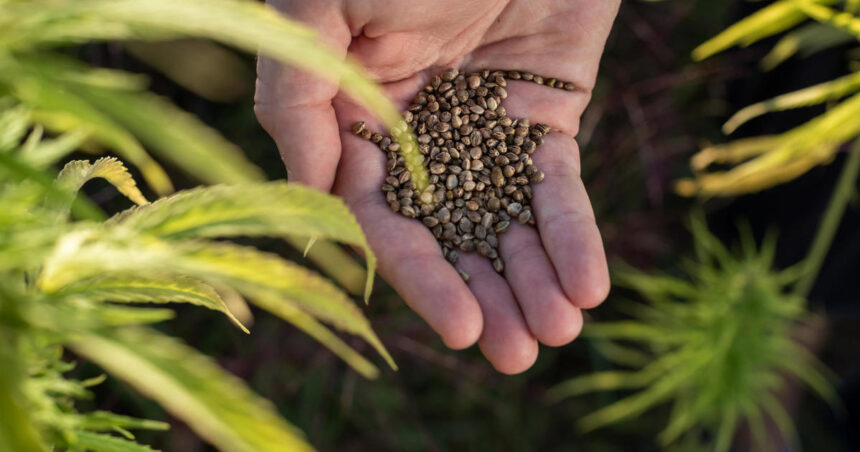MIAMI – At the same time Governor Ron DeSantis has come out against a constitutional amendment to legalize marijuana in Florida, he is likely to throw an unexpected lifeline to the hemp industry by vetoing a bill that would regulate and limit the sale of cannabis products such as Delta 9, according to four sources familiar with the discussions inside the governor’s office.
If signed into law, Senate Bill 1698 would restrict the sale of THC products, such as Delta 9. It would also prohibit the manufacturing and sale of the increasingly popular and more potent products containing Delta 8 and Delta 10. Hemp supporters have said that if the bill became law, it would decimate the hemp industry, throw thousands of people out of work, and cost the state billions in revenue.
By vetoing the bill, and thereby keeping the hemp industry alive in Florida, DeSantis would be adopting a strategy akin to “the enemy of my enemy is my friend.” According to those familiar with his thinking, DeSantis is counting on the hemp industry to finance the campaign against Amendment 3, which would legalize recreational marijuana for anyone 21 and older.
“It’s been flying under the radar, but he’s going to veto,” said one official, who like others interviewed for this story requested that their name not be used for fear of angering the governor. “The marijuana people are furious, and they are scrambling.”
“There was never a thought the Governor would veto the bill,” said a second source. “But they are now signaling that they are going to veto, and I think it would be fair to say he is leaning toward a veto.”
A third source who supports the hemp bill and is frustrated by the governor’s possible maneuvering, noted: “I don’t know how you can be against recreational marijuana and be in support of hemp. It doesn’t make sense, unless what you are really looking for is money from the hemp industry.”
A spokesman for the Governor declined to comment, noting that they will inform the public when a decision is made.
Although the average person may not realize it, the hemp industry and the marijuana industry are two distinct entities that are bitter rivals throughout Florida.
Hemp and marijuana both come from the cannabis plant.
Hemp products are made from male plants that have lower levels of THC, the chemical compound in the plant which creates the euphoric, psychoactive effects.
Marijuana comes from the female plant and has a much higher level of THC.
In 2016, Florida voters approved medical marijuana. To receive marijuana, a person has to be diagnosed by a doctor with a specific ailment, the marijuana needed to be sold through a licensed dispensary, and anyone with a medical marijuana card needs to be part of a registry. In 2023, the marijuana industry – which is controlled by a handful of companies in Florida – had approximately $2 billion in sales.
In 2018, the United States Congress, through the Farm Bill, made hemp products legal with little regulation. As a result, the hemp industry exploded, with thousands of people growing hemp, fueling the proliferation of so-called “smoke shops” or “hemp shops” across the state which sell a variety of hemp products, the most popular of which have been Delta 9 and Delta 8 gummies.
Because of a loophole in federal law, the potency of these hemp products, which was supposed to be limited, could be far higher than they are advertised to be. And since buying hemp products does not require a person to obtain a doctor’s note or be part of a registry, the sale of hemp products exploded across the country. In Florida, it was estimated to have generated $10 billion in sales in 2022 – nearly five times the sale of medical marijuana.
Critics of hemp argue because there is little regulation and testing, hemp products can contain dangerously high levels of THC as well as other hazardous substances such as lead and mercury. And because it is available in so many locations – including gas stations and convenience stores – they can work their way into the hands of children.
“If he vetoes the bill, he runs the risk of more kids overdosing and ending up in emergency rooms,” said a hemp critic. “And that will piss off a lot of moms. So, there is a risk to vetoing the bill.”
The fight between hemp and marijuana has made for some strange and interesting bedfellows. The chair of the Republican Party of Florida, Evan Power, is the leading lobbyist for the hemp industry. And the chair of the Florida Democratic Party, Nikki Fried, was one of the leading proponents of hemp when she served as the state Agriculture Commissioner.
“I’ve had conversations with staff on the bill,” Power told CBS Miami. “And he is moving toward a decision. And we hope he doesn’t sign it.”
Fried told CBS Miami: “Expanding access to cannabis is a non-partisan issue with broad support in Florida. Hemp products provide relief to millions of Floridians — including veterans, seniors, and patients with chronic pain. Any attempts at regulation should protect consumers, while considering the impact on accessibility for patients and the ability of small businesses to compete.”
CBS Miami has learned that late last week, DeSantis’s chief of staff, James Uthmeier, called the sponsor of the hemp bill, Senator Colleen Burton, to inform her the Governor was going to veto the bill. According to two sources, Burton became irate and lambasted Uthmeier prompting him to tell the senator they would take a second look at the bill.
“She pushed back pretty hard,” said one person briefed on the call.
Burton declined to comment on the call, telling CBS Miami, “The Governor is in the process of reviewing the bill.”
Under legislative rules, before the Governor can either sign or veto a Senate bill, it must be formally “transmitted” to him by Senate President Kathleen Passidomo. As of Thursday afternoon, Passidomo was still holding onto the bill. “The Senate has held off sending him the bill to try and convince him to sign it,” one source said.
Despite these efforts, there is a growing expectation he will issue a veto.
“The governor wants to kill the marijuana amendment,” said another source familiar with the discussions. “[By vetoing the hemp bill] he’s trying to do the calculation that would help him kill the amendment.”
By vetoing the hemp bill, he can keep the people using Delta 9 and Delta 8 happy, which will make them less motivated to vote for the marijuana amendment. If he signs the hemp bill, then the only alternative for those folks will be to legalize marijuana, which could spur them to vote for the amendment.
“The veto is for voters and money – keep people from feeling the need to vote for marijuana and get the hemp industry to contribute the money to help fight the amendment,” the source said.
Ironically, the person added, if the marijuana amendment fails in November, there would be nothing stopping DeSantis from turning around in the next session to resurrect the hemp bill and kill the industry.
If the governor vetoes the hemp bill, he could cite a variety of reasons.
Veterans and gun owners have been lobbying the governor’s office to keep hemp products available to them because under federal law, if they apply for and receive a medical marijuana card, they are prohibited from purchasing a firearm.
Supporters of Charlotte’s Web – a non-euphoric version of hemp that has been used to treat children with epileptic seizures in Florida since 2014 – have been arguing SB 1698 would also outlaw the products they use for their children. The Governor could use the fears of parents as an excuse to veto the bill, even though Burton and others have made clear SB 1698 does not ban Charlotte’s Web products.
Another possible rationale the Governor could use to veto the bill is over the issue of smell. The governor has made the cornerstone of his campaign against marijuana the noxious odor that would come from people smoking marijuana.
DeSantis told reporters recently, “Look what’s happened in Denver, Colorado. Look what’s happened in Los Angeles, New York City. You know, I’ve talked to people that have moved from New York and they’re like, they used to have, you know, an apartment somewhere and it used to (smell differently). Now, what does it reek of? It reeks of marijuana. I don’t want the state to be reeking of marijuana.”
(What DeSantis fails to mention, however, is that if the amendment were to pass, the Legislature could place restrictions on smoking marijuana, opting instead for ingestible forms of marijuana – cookies, gummies, and chocolates.)
DeSantis could also veto the bill saying the state should wait and see if voters approve amendment 3, and then call on the legislature to deal with both measures – marijuana and hemp – in the 2025 legislative session.
“We should have a decision soon,” said one of the sources.












